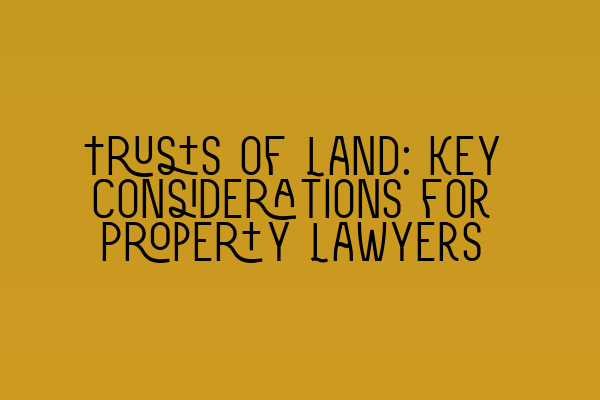Trusts of Land: Key Considerations for Property Lawyers
As a property lawyer, it is essential to have a thorough understanding of trusts of land. Trusts of land refer to the legal arrangement where a person, known as the trustee, holds the legal title to a property for the benefit of another person, called the beneficiary. This legal concept can have significant implications for the ownership, management, and transfer of property. In this article, we will explore some key considerations for property lawyers when dealing with trusts of land.
1. Understanding the different types of trusts
There are several types of trusts of land that property lawyers should be familiar with. The most common ones are express trusts, resulting trusts, and constructive trusts. An express trust is created through a formal written agreement between the trustee and the beneficiary. On the other hand, resulting trusts arise when property is transferred, but the intended beneficiary is unclear. Constructive trusts, on the other hand, are created by the courts to prevent unjust enrichment.
2. Identifying the parties involved
In order to effectively deal with trusts of land, property lawyers must clearly identify the parties involved. This includes understanding the roles and responsibilities of the trustee, as well as the rights and entitlements of the beneficiary. Property lawyers should ensure that the legal documentation accurately reflects the intentions and wishes of the parties involved.
3. Compliance with legal requirements
When dealing with trusts of land, property lawyers must ensure compliance with all legal requirements. This includes ensuring that the trust is properly executed, and that all necessary legal documentation is in place. Failure to comply with legal requirements may render the trust invalid or unenforceable, which can have serious consequences for all parties involved.
4. Managing conflicts of interest
Conflicts of interest can arise in trust matters, particularly when the trustee has competing interests or obligations. Property lawyers must navigate these conflicts carefully and ensure that their actions are always in the best interests of the beneficiary. Open and transparent communication with the parties involved is crucial to address any conflicts and maintain trust and integrity.
5. Transfer of property
Another key consideration for property lawyers in trusts of land is the transfer of property. This may involve transferring legal title from the trustee to the beneficiary, or from one trustee to another. Property lawyers must ensure that all necessary legal requirements are met, and that the transfer is properly documented and registered, if required.
6. Tax implications
Trusts of land can have significant tax implications, and property lawyers must be aware of these considerations. Depending on the jurisdiction, there may be taxes on the transfer of property or capital gains tax obligations. Property lawyers should work closely with tax experts to ensure that all tax obligations are met and that their clients are in compliance with the law.
7. Dispute resolution
In the event of a dispute related to trusts of land, property lawyers play a crucial role in resolving the issue. This may involve negotiation, mediation, or litigation depending on the nature and complexity of the dispute. Property lawyers should have a strong understanding of dispute resolution mechanisms, as well as the ability to protect their client’s interests through effective legal representation.
In conclusion, trusts of land are a complex area of property law that property lawyers must navigate with precision and diligence. By understanding the different types of trusts, identifying the parties involved, complying with legal requirements, managing conflicts of interest, facilitating property transfers, considering tax implications, and effectively resolving disputes, property lawyers can provide valuable legal services to their clients. It is crucial for property lawyers to stay updated on changes in trust law and seek ongoing professional development to ensure they can deliver the best outcomes for their clients.
If you are aspiring to become a property lawyer and want to prepare for the SQE exams, check out our related articles for more information:
– SQE 1 Practice Exam Questions
– SQE 1 Practice Mocks FLK1 FLK2
– SQE 2 Preparation Courses
– SQE 1 Preparation Courses
– SRA SQE Exam Dates
These resources will help you in your journey towards becoming a successful property lawyer and passing the necessary exams. Good luck!
